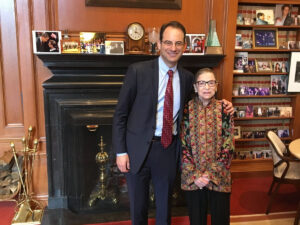Widgetized Section
Go to Admin » Appearance » Widgets » and move Gabfire Widget: Social into that MastheadOverlay zone
Colorado AG Weiser on Ginsburg: ‘No one will ever be able to fill her shoes’
Colorado Attorney General Phil Weiser on Monday issued a statement on the death of his former boss, Ruth Bader Ginsburg (see below).
Ginsburg’s death has touched off a heated debate on whether Republicans should force through an appointee of President Donald Trump and how another conservative on the high court will impact health care, women’s reproductive rights and other critical issues.
In July of 2018, during his campaign for AG and the controversial Senate appointment of Trump pick Brett Kavanaugh, RealVail.com interviewed Weiser, a Democrat, and got his thoughts on the conservative-liberal makeup of the court, including the Senate rejection of President Ronald Reagan selection Robert Bork and ultimate appointment of Anthony Kennedy in the 1980s. Here’s some of that interview with Weiser:
“I am also concerned about Kavanaugh’s influence on a court that is on the far right. The Supreme Court at its best is an institution that has [conservative Anton] Scalia’s mindset, [liberal Ruth Bader] Ginsburg’s mindset and everything in between. Right now what we’re facing is a court that is pulled to the far right so that on matters like Roe versus Wade the case is going to be hardwired before it even gets decided. That is also a real threat that Kavanaugh poses.
“What happened with [Robert] Bork’s nomination is we had a national conversation about whether we were willing to have far-right-minded people dominate the court and that was for a seat that [Lewis] Powell had held. Powell had been a swing vote.
“And the call then, as I believe the call now should be, was a justice in the mode of Powell. We need a justice in the mode of Anthony Kennedy, who is more moderate, more mainstream, open to thinking about issues so they’re not decided in a hardwired way before they get to the court.
“It is a concern, it should be addressed at the hearings. Picking judges is not a legal process. It’s a political process. Whatever is allowable is what our politics will allow. This is why if a political leader, whoever the person might be – [Republican Attorney General candidate] George Brauchler, [Repubican Colorado Sen.] Cory Gardner, whoever – is unwilling to speak about these issues, that’s a dereliction of your moral authority.
“We need to create an environment that’s clear about duties to the republic and that includes the rule of law and if someone commits crimes, or if someone abets crimes, we do not look the other way because they’re in our party. It’s principle above party and we need an attorney general in Colorado where there are no questions.”
Here’s Weiser’s most recent statement on the death of Ginsburg:
As the Jewish New Year (Rosh Hashanah) ushered in a time of renewal and reflection on Friday night, we experienced the end of a great and historic life–the loss of Justice Ruth Bader Ginsburg. A champion of women’s rights, equality, and justice, Justice Ginsburg taught the world–and taught me–to see justice and freedom differently and to work for a better future for all. To lose a moral anchor like her in a time of such hardship and division is especially difficult.

“The personal is political” has long been a rallying cry of the feminist movement that Justice Ginsburg helped empower. For me, her passing is both personal and political, since RBG was an important mentor and friend to me for many years.
Clerking for Justice Ginsburg remains a cherished experience in my legal career. Her wisdom and courage inspires my fight for civil rights, gender equality, and women’s reproductive rights. RBG became an important force in my path as a lawyer–leading to my work as the attorney for the people of Colorado. She was a source of kindness in the lives of my children as my family grew. That’s one of the reasons it was such an honor that she spoke at my investiture as Attorney General of Colorado. I was also the last person to argue a case in front of Justice Ginsburg, which I discuss in this recent interview on her passing.
Sadly, the death of this American icon, who was my friend and mentor, has created a bitter fight over filling her seat. Regardless of how that plays out, no one will ever be able to fill her shoes.
In keeping with the theme of “the personal is political,” RBG the person was just as extraordinary as her larger-than-life public persona became. Her fame was based on substance, moral courage, and on her embodiment of the best in human nature. She was compassionate, kind, and empathetic–and she shaped the evolution of American justice with those brave qualities and an extraordinary intellect. In doing so, she also shaped generations of young people both through the law and through her example. And she also made the Supreme Court a better and more collegial institution, building strong relationships with justices across the spectrum (most famously, Justice Antonin Scalia) and highlighting the importance of being willing to listen to and learn from those with opposing viewpoints (as I explained in this blog post).
In the wake of Justice Ginsburg’s passing, many writers and religious figures have described her as a “tzadik” or a “righteous” person, as signified by her passing just before Rosh Hashanah. As she shared with me, her favorite line from the Bible was “righteousness, righteousness shall you pursue” (also translated as “justice, justice shall you pursue”). I will continue to live by the example of the Righteous RBG and to be a better person and lawyer because of her. I know I won’t be the only one.
May her memory be a blessing.


